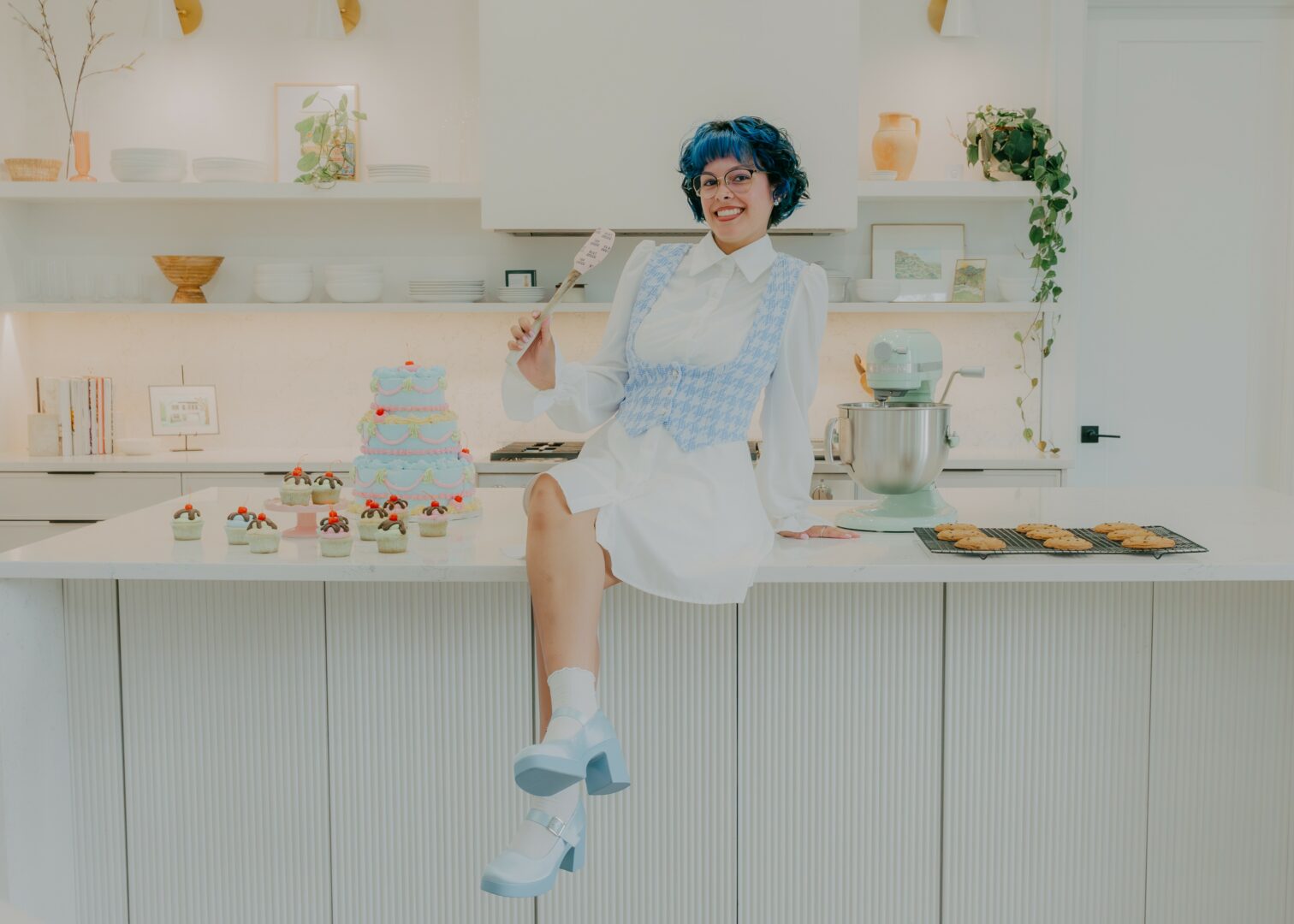Alright – so today we’ve got the honor of introducing you to Abby Mccolgan. We think you’ll enjoy our conversation, we’ve shared it below.
Abby, first a big thank you for taking the time to share your thoughts and insights with us today. I’m sure many of our readers will benefit from your wisdom, and one of the areas where we think your insight might be most helpful is related to imposter syndrome. Imposter syndrome is holding so many people back from reaching their true and highest potential and so we’d love to hear about your journey and how you overcame imposter syndrome.
In my experience imposter syndrome isn’t something you overcome once and never deal with again. Instead it comes in waves— some days you look at your work and think “this is great, I’m definitely on the right path!” while others leave you struggling to muster a single positive thought. Being surrounded by talented creatives in spaces like art school or social media can make this even tougher. It takes a lot of confidence to start believing in yourself, but just a glance at someone else to send you spiraling down a path of self-doubt. Personally I’ve always had trouble accepting a sense of self-worth, no matter what I did to convince myself. So eventually I decided that if I can’t trust my own word I should place my trust in others’. When friends, family, or classmates compliment my work I take it to heart, because your perspective is completely different from those around you. In a conversation with my sister I remember brushing something off as simple. In response she said “You know not everyone can do that, right?” It’s easy to view your skills as nothing special when they’ve become so normal through your eyes. That’s why I choose not to look at it through my eyes, at least not all the time. Watching others’ reactions, scrolling through social media comments, chatting with my professors, putting myself out there, that’s how I’ve come to value my skills more.
It’s also important to remember that art isn’t a competition. If anything the best art is born from collaboration, a melding of minds and ideas. Someone you deem “out of reach” probably thinks the same way about someone else, maybe even you! Imposter syndrome is a daily battle, one I may never rid for good, but believing in the people that believe in me is enough fuel to keep the fire going.


Thanks, so before we move on maybe you can share a bit more about yourself?
Currently I’m a comic artist and illustrator enrolled at the Savannah College of Art and Design (SCAD) with a passion for memoir, comedy, and children’s writing. Comics as a medium have always been so fascinating to me. They’re unlike anything else— a form of visual storytelling like film or television yet so much of it happens in your head. The bold sound effects, the action lines, the intricate art and paneling, I knew I had to be a part of it! As a kid I used to make quick doodle comics based on whatever I was into at the time. Then as I grew older it became a form of self expression. Whether a short comedy gag about goofing off with my friends or a cathartic tale of self-reflection, comics became my go-to way to share my thoughts and feelings. Eventually the dream is to make a whole graphic novel out of that, maybe multiple if I’m lucky!
Currently I’m planning out a graphic novel pitch about my experience being half-filipino half-white, specifically focusing on the identity confusion that comes with being mixed, my first trip to the Philippines, and the Filipino experience living in the UAE. I’ve also been working on a mini-comic for Level Ground Comics’ water-themed anthology, Run-off. If you’re interested keep an eye out for its release later this year!


There is so much advice out there about all the different skills and qualities folks need to develop in order to succeed in today’s highly competitive environment and often it can feel overwhelming. So, if we had to break it down to just the three that matter most, which three skills or qualities would you focus on?
The first quality that got me to where I am now was dedication. Pursuing art professionally is hard. It can suck up a lot of time, energy and brainpower, especially if you want your work at its very best. Without the amount of dedication I put towards this craft I never would’ve made it past IB art in high school, much less my first few years at college.
The second quality is open-mindedness. A crucial part of improvement is welcoming criticism and learning new things. Most of my biggest growth spurts as a creative were spurred on by the guidance of a professor, a classmate’s advice, or a helpful weekend workshop. Keeping yourself open to all opinions, even if you don’t necessarily agree with them, will help you significantly more than shooting down any suggestion that doesn’t align with what you’re already doing.
The third quality is curiosity. The one thing every writer needs—from comic artists to novelists to children’s book authors—are ideas, and good ideas don’t just fall from the sky. Life experiences, engaging with media, going out of your way to learn new things, be curious about the world around you and it will reward you handsomely.
Based on these qualities here’s some advice for anyone looking to start their comic journey!
1. Keep a notebook! You never know when inspiration may strike, your future magnum opus could be conceived while you’re out on a weekend grocery run or on the morning commute! But that story can’t be told if you don’t remember it. Personally I love making mind maps to get all my ideas out on paper, even ones that won’t go anywhere.
2. You don’t need to have the most ground-breaking concept to write a good story. These days it’s so easy to get lost trying to make the next big thing, to find some innovative never-before-seen idea that’ll turn the industry on its head. But tons of successful stories have simple premises. In my opinion it’s more about how you execute them and whether you can make the audience care about the characters and world you’ve conceived, no matter how complex it is.
3. Check with other people all throughout the creation process. Comics can take a while to make, and when you spend so much time staring at your own work details tend to slip through the cracks. Ask about narrative clarity, if the paneling is readable, whatever you can to ensure that other people will understand your story just as well as you do in your head. Maybe they’ll catch an inconsistency or have some ideas for improvement. Keep that mind open, because a good comic should make sense to everyone who reads it, not just the author.


Any advice for folks feeling overwhelmed?
I get overwhelmed pretty often, most artists do. Between classes, job hunting, clubs, workshops, out-of-school obligations, applications, passion projects, and whatever else it can feel impossible to get everything done. For me breaking down tasks into smaller tasks makes a heavy workload feel more manageable. Instead of “finish this comic” or “design this project” I’ll divide it into steps: finish thumbnails, finish sketches, finish clean inks, etc. I’m a big fan of checklists because each box checked gives me just enough dopamine to keep treking on. I like organizing these by priority— tasks with a hard deadline come first while long-running to-do’s are left to simmer for a bit longer.
This is specific to me but another thing I do when I need to sort out my thoughts is cook. Cooking is a fairly automatic task, especially when you know the recipe well, but it’s one that needs to be done regardless. It gives me the chance to take a step back, really think through all my responsibilities, and figure out a plan all while completing something I would’ve had to do anyways.
Contact Info:
- Website: https://abbymccolgan.myportfolio.com/
- Instagram: https://www.instagram.com/ant_comics/
- Linkedin: https://www.linkedin.com/in/abbymccolgan


so if you or someone you know deserves recognition please let us know here.




